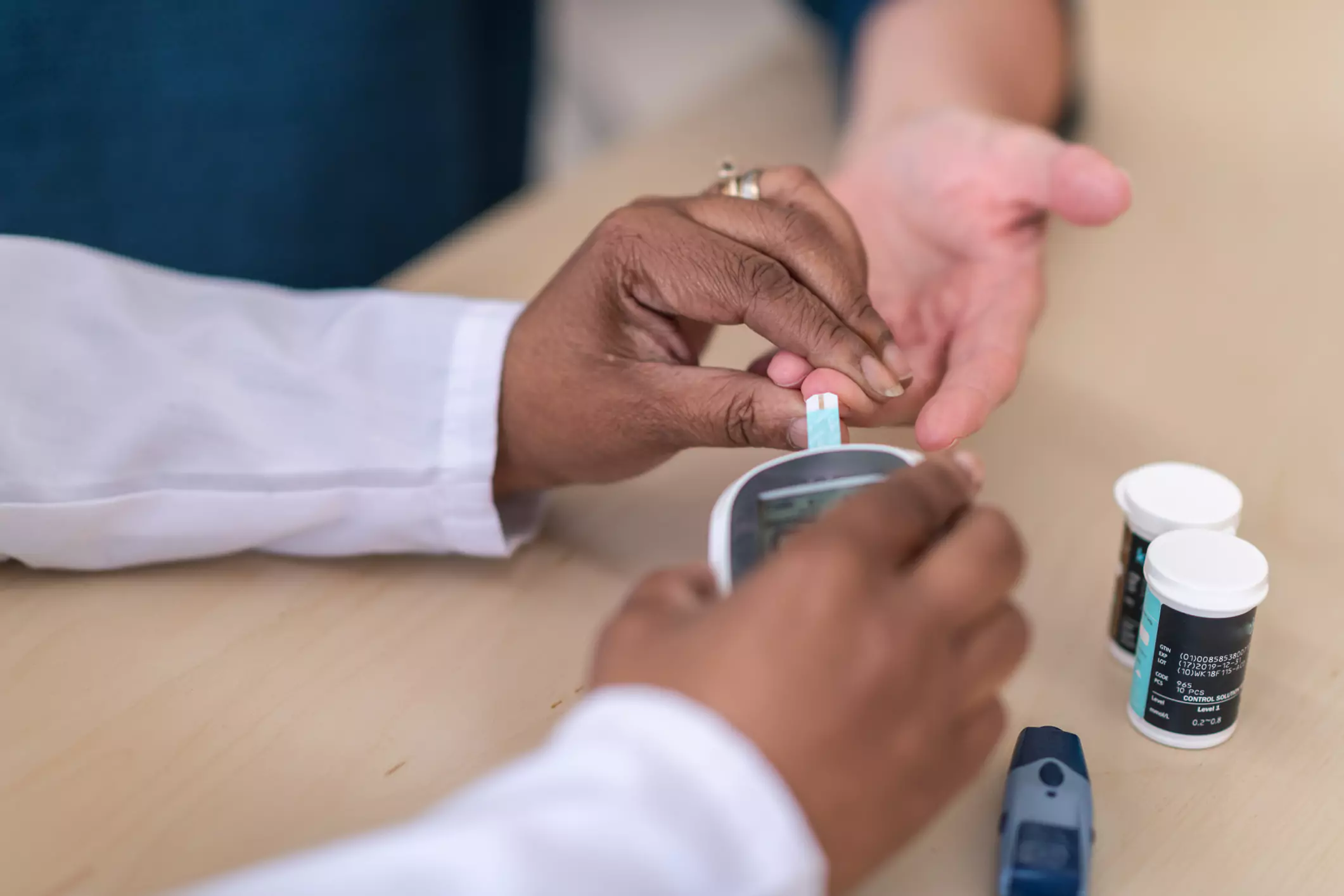






DOES DIABETES CAUSE HAIR LOSS?


Table of Contents
- How do high insulin levels contribute to hair loss?
- Diabetes and the hair growth cycle
- How can you help to reduce and manage stress to prevent hair loss due to diabetes?
- How To Prevent Losing Hair Due to Diabetes?
- Make sure you're getting enough Biotin to prevent Diabetic Hair Loss!
- An Intriguing trace mineral to think about Silicon dioxide (SiO2)
- What medications can help with hair loss?
- About the author
- Who is Dr. Ergin?
You are experiencing hair loss and are concerned about it. Can this be diabetic hair loss? You're curious whether diabetes or insulin resistance is a factor, and if so, how to address the problem. Today, we'll discuss the causes and treatments for hair loss, even if you have diabetes or insulin resistance. What does diabetes or insulin resistance have to do with hair loss, you ask? A great deal!
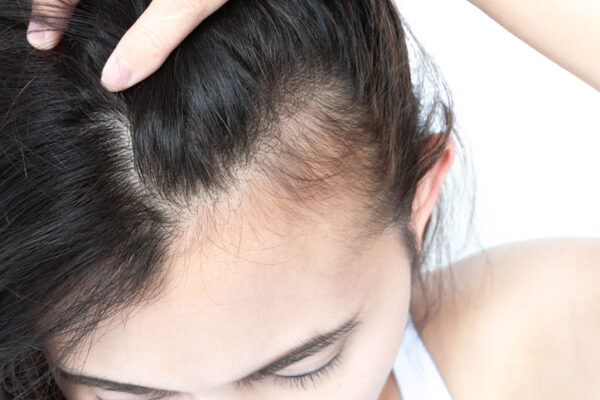
Women have serious hair loss problems due to diabetes.
People with diabetes (or even prediabetes) can experience hair loss all over their bodies in various ways. This often occurs because of the reduced growth cycle that takes place due to the high levels of sugar already present in the bloodstream. The result is continually falling hair with no good replacement for the follicles once lost, leaving baldness or thinning patches that won’t easily go away until diabetes is managed effectively.
So yes, diabetes does cause hair loss, but there are ways to get it under control if you catch it soon enough and make necessary lifestyle changes. Diabetes is a serious health condition and one of the most common complications associated with diabetes is hair loss. This type of hair loss, known as "diabetic alopecia," occurs when diabetes affects the blood flow to the scalp and causes permanent damage to the follicles.
Typically, someone with diabetes will experience signs of hair loss after five years from diabetes onset. Treatment for diabetes-related hair loss involves controlling diabetes, regulating blood glucose levels, and maintaining a healthy lifestyle. Fortunately, some medications can help reduce diabetes-related hair loss in some cases. It is important for those affected to consult with their doctor and determine the best course of action.
Stress, hormones, high blood sugar levels, underlying health conditions such as diabetes or PCOS, thyroid problems, and so on can all have an impact on hair growth. If you have diabetes, your body either does not produce insulin or does not use it effectively.
How do high insulin levels contribute to hair loss?
Women with insulin resistance and/or PCOS, for example, typically have high levels of testosterone induced by high insulin levels, which can cause hair loss. Testosterone is eventually converted into dihydrotestosterone, which is ultimately responsible for hair loss. If a woman or a man is insulin resistant, they produce more DHT.
You will also have high blood sugar if you do not have insulin or if it is not used effectively. Excess sugar can harm organs throughout your body, including your eyes, nerves, and kidneys. It can also cause blood vessel damage. These vessels transport oxygen throughout your body, nourishing organs and tissues.
Blood vessels that are damaged may not be able to deliver enough oxygen to your hair follicles. This lack of oxygen has the potential to disrupt your normal hair growth cycle. Hair follicles are especially vulnerable to nutrient deficiency, so hair loss is unavoidable if blood vessels carrying nutrition do not meet the needs.
Diabetes and the hair growth cycle
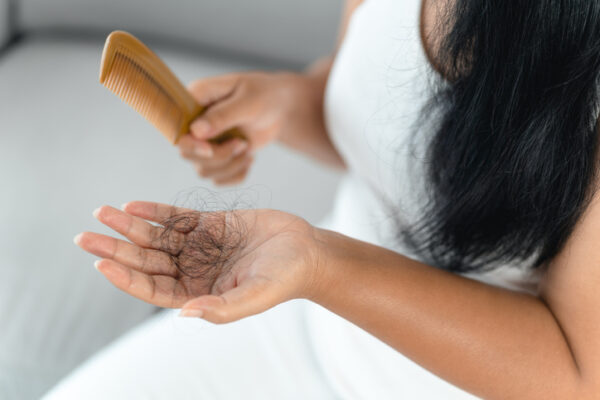
Hair fall problem. Asian woman with comb and hair problems. Hair loss from the comb. Hair care and beauty concepts.
Diabetes is capable of causing hair loss across the skin, not just the scalp, leading to result that can be quite alarming. Typically, hair goes through three stages. Diabetes can disrupt this process, slowing hair growth. Diabetes can also cause you to lose more hair than you normally would. That thinning hair isn't just on your head.
Hair loss can occur on your arms, legs, and other body parts. When hair regrows, it does so at a slower rate than usual. Hair loss in your arms and legs is especially important to report to your doctor because it could be an indication of poor blood flow, which can lead to ulcers or even amputation if left untreated.
People with type 1 diabetes are at an increased risk of developing alopecia, a disorder of the immune system which can result in falling or loss of hair. The disease affects the growth cycle of hair, as the attacking cells produce antibodies that result in patches of hair loss on the head and other parts of the body. Consequently, having diabetes makes it more difficult to control glucose or sugar levels which can result in prediabetes if left unchecked.
When this happens, it increases the chances of developing alopecia because high glucose levels are often associated with medical conditions such as kidney disease, hypertension, and other health issues. Therefore, for people suffering from type 1 diabetes, controlling their glucose level is essential for not just preventing further health complications but also protecting them from developing alopecia.
Diabetes can cause hair loss, but you may also lose hair as a result of stress from living with a chronic illness or from diabetes medications. Some diabetics have thyroid disease, which can contribute to hair loss. Hair loss can be reversed in some cases. There are several remedies and treatments available, some of which differ for men and women.
The most effective way to do this is to keep blood sugar levels under control and manage stress. Anyone can control their blood sugar levels by regularly monitoring them, taking all medications and supplements, such as SugarMD Diavitamin, which contains all of the essential vitamins and nutrients your hair requires, as well as eating a balanced and healthful diet, exercising regularly, and reducing stress. Let's take a look at each of these and how they can help you recover from hair loss.
How to induce hair growth despite diabetes?
If you're dealing with diabetes-related hair loss, it's important to understand that while diabetes is often the cause or contributing factor in hair thinning, there are steps you can take to try and re-stimulate hair growth.
The higher sugar levels in the body result in a decrease of necessary nutrients for healthy hair and lead to a decrease in protective oils for the hair that help regulate hydration levels. Without proper care, severe cases of diabetes could result in baldness from hair loss across many body parts.
Eating a balanced diet with plenty of protein, biotin, and other essential vitamins is key, as well as refraining from habits like excessive heat styling or pulling on the scalp when brushing. There are also over-the-counter and prescription medications that have proven to help stimulate re-growth, as well as topical treatments such as serums containing peppermint oil that can be applied directly onto the scalp to encourage new hair strands.
If natural methods don't seem to be providing relief, consulting with a dermatologist or trichologist may provide more targeted options for inducing much-needed hair regrowth.
How can you help to reduce and manage stress to prevent hair loss due to diabetes?
Seeking the support of friends and family, seeking counseling, and employing relaxation techniques such as meditation, yoga, and deep breathing exercises can all be beneficial. If your hair loss is caused by diabetes, you may need to change your diet, lifestyle, or medication to improve your blood sugar control.
Monitor your blood sugar more frequently and record it in the sugarMD app, which allows you to do a variety of analyzing, reporting, and sharing. You should notice a reduction in hair loss once your diabetes is under control. You'll lose fewer hairs and regrow more of the ones you've already lost.
The problem with diabetes is that it causes you to lose vitamins and minerals, especially if it is uncontrolled. You will be deficient before you know it unless you replenish it, particularly benfotiamine, B complex vitamins such as biotin, Vitamin D, and so on.
How To Prevent Losing Hair Due to Diabetes?
There are many results of having diabetes or prediabetes, one of which is hair loss. This happens because high blood glucose and insulin levels can result in falling hair growth. To prevent this, it is important to reduce insulin resistance.
Reducing the consumption of sugar and foods with a high glycemic index, as well as practicing exercise, can help lower the amount of glucose entering the bloodstream and minimize the impact on your hair growth. With the correct dietary practices, there may be visible results within a matter of weeks and a general improvement over time.
Therefore, reducing insulin resistance by changing lifestyle habits is key in preventing hair loss associated with diabetes or pre-diabetes. Taking serious steps toward reducing insulin resistance can result in many positive physical changes.
For those with diabetes, prediabetes, or any other condition causing higher-than-normal levels of glucose and sugar in the blood, reducing insulin resistance will result in improved blood supply to the hair follicles, which leads to healthier hair growth.
On the flip side, for those dealing with hair loss and falling hair due to various causes, decreasing levels of insulin resistance likely results in a reduction of deterioration and an increase in healthy scalp growth, resulting in thicker and fuller hair.
Therefore improving the body’s restraint on its release of insulin could result in significantly healthier hair for many individuals. By improving the blood supply to the hair follicles, people can reduce their risk of further falling out by helping to stimulate new growth for their remaining strands as well as foster healthy growth in any new hairs that come in. It's clear that tackling insulin resistance will certainly help reduce hair loss and increase the chances of regrowth.
Make sure you're getting enough Biotin to prevent Diabetic Hair Loss!
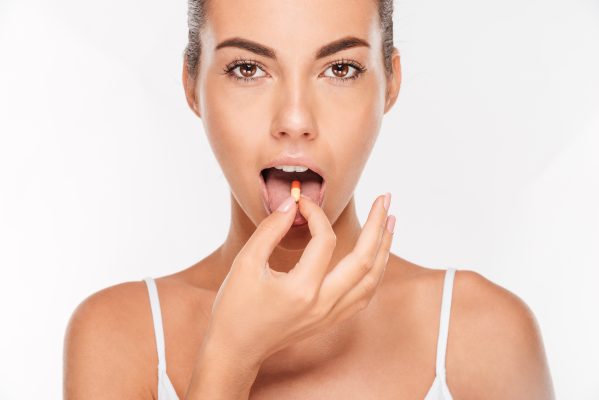
Diabetic vitamins can help reduce hair loss
Biotin is an important result of the growth of healthy hair that is often lacking for those people with diabetes or prediabetes. People with diabetes are more prone to lower-than-normal levels of biotin and as a result are at risk for thinning, falling, and premature greying of their hair.
Taking biotin as part of your daily supplementation, as well as getting it from foods like peanuts, almonds, sweet potatoes, eggs, onions, and oats can result in improved glucose and sugar levels while preventing any additional hair loss.
I recommend almonds specifically if you are diabetic so that you can still get the benefits without having to take excess carbohydrates in the sweet potato form. There is some evidence that taking biotin supplements orally may help to slow hair loss.
The recommended adequate intake for adults is 300 micrograms per day, but some supplements (not our sugarMD dia vitamin) contain much higher amounts, which can affect your thyroid test results. So, if you are taking more than 5000 mcg of biotin, inform your doctor before having a thyroid test.
An Intriguing trace mineral to think about Silicon dioxide (SiO2)
Also known as silica, Silicon dioxide is a naturally occurring trace mineral composed of silicon and oxygen. It occurs naturally in a variety of plants, including leafy greens and whole grains. It's also used as a filler in a lot of supplements.
For individuals suffering from hair loss or weak strands, silica has been found to result in stronger, healthier hair. Not only does it improve the growth of existing hair, but it has also been documented in the prevention of further loss. Silica helps balance blood sugar levels and improve glucose tolerance in those with prediabetes and diabetes, making it essential for fighting insulin resistance and ultimately preventing premature falling of hair.
Its ability to prevent diabetic symptoms and fortify hair result in a tremendous benefit to those struggling with potential issues related to sugar metabolism and their locks. Also, don't underestimate the importance of exercise. Wait a minute, did I say exercise to make your hair grow faster? I believe I just did.
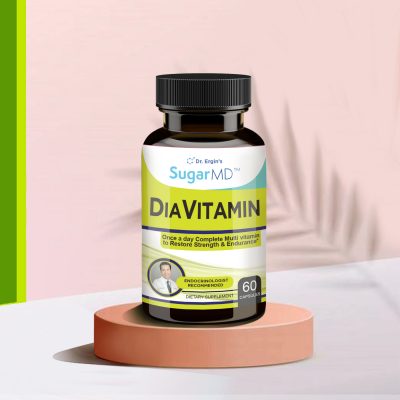
Although exercise will not stop diabetic hair loss, it will help the body maintain proper blood circulation. Exercise on a regular basis can help increase blood flow to various parts of the body, including the hair follicles and the upper and lower extremities. It can also aid in the control of blood sugar levels. So, yes, exercise can help prevent hair loss indirectly.
Also, SugarMD Diavitamin is an amazing solution for those suffering from hair loss. It contains a robust blend of vitamins and minerals, ensuring hair results and growth. People with diabetes or prediabetes are especially at risk for falling prey to this condition.
The high concentration of glucose in the blood can cause a breakdown in the scalp, resulting in thinning and loss of hair. SugarMD Diavitamin helps by keeping the scalp healthy, allowing hair to grow and stay thick. With regular use of this vitamin supplement, one can observe the positive results in their fight against hair loss due to diabetes or prediabetes.
What medications can help with hair loss?
Your diabetes doctor may prescribe a topical medication such as minoxidil (Rogaine), which you apply to your scalp and other areas of hair loss. For the result of hair growth, men can take a pill called finasteride (Propecia) to regrow their hair.
Although this medicine is typically used by men, I also use it off-label for women at a lower dose on occasion. Another medicine used in women to help with hair growth is Aldactone or spironolactone which blocks the action of testosterone.
Those suffering from diabetes or prediabetes often experience falling of their hair due to high glucose or sugar levels that are found within these conditions. By taking glucose-lowering medications like Metformin and keeping blood sugars within normal range, the result is most often either no further hair loss or possibly some regrowth of their natural hair.
When you are faced with hair loss due to the result of illness, diabetes, or pre-diabetes, traditional solutions for hair growth like pills and topical treatments may not result in the desired outcome. As a result, many people turn to wigs as their last resort option.
Wigs can create the full head of hair that many people want without the need for extensive treatments or waiting for delayed results from using products. Plus, wigs look natural and stay firmly attached even if blood sugar levels or glucose levels fluctuate.
Instead of feeling hopeless about falling hair, opting to get a wig can help restore confidence while also maintaining sugar levels naturally. Wigs remain an important option no matter what illness or pre-diagnosis may be present and can be customized to fit individual needs best.
If your diabetic hair loss affects a large area of your scalp, you may want to cover it temporarily with a wig or hairpiece. The cost is reasonable, and you can take the wig off when you no longer require it. I hope that by watching this video, you will never get to that point! So, everyone, thank you for tuning in. We'll catch up with you in the next article.
About the author
Who is Dr. Ergin?
Dr. Ahmet Ergin is an endocrinologist interested in and passionate about diabetes care. Dr. Ergin earned his medical degree with honors at Marmara University School of Medicine in Istanbul, Turkey. Then, he completed his internal medicine residency and endocrinology fellowship at Cleveland Clinic in Cleveland, Ohio.
He is a board-certified Internal Medicine and Endocrinology, diabetes, and metabolism physician. He is also a certified diabetes education specialist.
Disclaimer: Any information on diseases and treatments on this website is for general guidance only and must never be a substitute for the advice your doctor or other qualified healthcare professional provides. Always seek the advice of your physician or other qualified health care professional with questions you may have regarding your medical condition.
Written By Dr. Ahmet Ergin
453 total articles
Meet Dr. Ahmet Ergin, a highly skilled and dedicated endocrinologist with a passion for diabetes care. Dr. Ergin earned his medical degree with honors from Marmara University in Istanbul. He completed internal medicine residency and endocrinology fellowship at Cleveland Clinic. Dr. Ergin is board-certified in Internal Medicine, Endocrinology, Diabetes, and Metabolism due to his vast medical expertise. He's a certified diabetes educator, author of “The Ultimate Diabetes Book,” and founder of “the SugarMD YouTube channel.” Dr. Ergin offers exceptional diabetes care to his patients in Port Saint Lucie, FL, helping them manage effectively. For a closer look into his insights and experiences, connect with Dr. Ahmet Ergin on LinkedIn, Instagram, and YouTube.”
Disclaimer: These statements have not been evaluated by the Food and Drug Administration. Information on this website isn't intended to treat, cure or prevent any disease. Discuss with your doctor and do not self-treat.
Products









